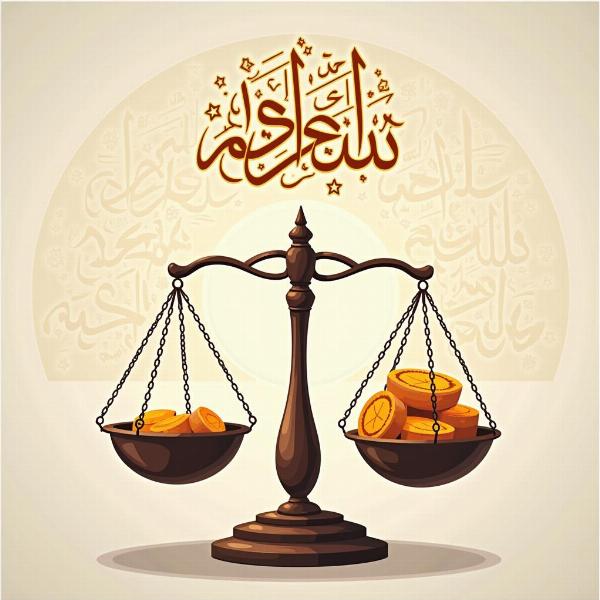Sawab meaning in Hindi revolves around the concept of reward for good deeds in Islam. Understanding sawab is crucial for grasping the Islamic ethical framework and how it motivates individuals towards righteousness. This article will delve into the various aspects of sawab, its significance, and how it influences the lives of Muslims.
The Essence of Sawab in Islamic Teachings
Sawab, often translated as “reward” or “merit,” represents the spiritual blessings bestowed upon a person by Allah (God) for performing good deeds and adhering to Islamic principles. It isn’t merely a material reward but encompasses spiritual fulfillment, closeness to God, and blessings in the afterlife. The concept encourages Muslims to strive for a life of piety and contribute positively to society. It is a cornerstone of Islamic morality, emphasizing the importance of intention and action in pleasing God.
 Sawab Concept in Islam
Sawab Concept in Islam
Different Types of Sawab: From Obligatory Acts to Voluntary Efforts
Sawab can be earned through various actions, ranging from obligatory religious duties like prayer (Salah) and fasting (Roza) to voluntary acts of charity (Zakat) and kindness. Even seemingly mundane actions, like smiling at someone or offering a helping hand, can carry significant sawab if performed with sincere intention.
Fardh (Obligatory): The Foundation of Sawab
Fardh actions, like the five pillars of Islam, are obligatory for every Muslim. Performing these duties diligently earns significant sawab and forms the foundation of a Muslim’s spiritual journey. Neglecting these duties, however, can lead to spiritual repercussions.
Sunnah (Recommended): Following the Prophet’s Example
Sunnah actions are those performed by the Prophet Muhammad (PBUH) and are highly encouraged for Muslims to follow. Emulating the Prophet’s actions brings substantial sawab and strengthens one’s connection to Islamic teachings.
Nafl (Voluntary): Going the Extra Mile
Nafl actions are voluntary acts of worship and kindness that go beyond the obligatory duties. These acts demonstrate a deeper commitment to pleasing God and can earn immense sawab. Nafl actions can range from extra prayers to acts of charity and service to the community.
How is Sawab Calculated? Understanding Divine Judgement
While the exact calculation of sawab is known only to Allah, the Quran and Hadith (sayings and traditions of the Prophet) provide guidelines. The sincerity of intention, the difficulty of the deed, and the impact it has on others are some of the factors that influence the amount of sawab earned.
The Importance of Intention (Niyyah)
The intention behind an action plays a crucial role in determining its sawab. An act performed solely for the sake of Allah carries far more weight than one done for show or personal gain.
The Magnitude of the Deed
The difficulty or effort involved in performing a good deed also influences the sawab earned. A deed performed despite facing challenges or obstacles carries greater reward.
Sawab in Daily Life: Practical Applications of the Concept
The concept of sawab permeates every aspect of a Muslim’s life. It serves as a constant reminder to strive for righteousness, even in seemingly trivial matters.
Sawab and Social Responsibility
Sawab encourages Muslims to contribute positively to society through acts of charity, service, and kindness. It promotes social cohesion and fosters a sense of responsibility towards others.
Sawab and Personal Growth
The pursuit of sawab encourages self-reflection and personal growth. It motivates individuals to constantly strive for improvement and to overcome their weaknesses.
Conclusion: Living a Life Guided by Sawab
Sawab, the concept of reward in Islam, is a powerful motivator for good deeds and righteous living. Understanding its significance allows Muslims to align their actions with Islamic principles and strive for a life of piety and spiritual fulfillment. It promotes both individual growth and social responsibility, making it a cornerstone of the Islamic faith. By seeking sawab, Muslims aim to earn the pleasure of Allah and attain blessings in this life and the hereafter.
FAQ
- What is the meaning of sawab in simple terms? Sawab is the reward or spiritual merit earned for performing good deeds in Islam.
- Can non-Muslims earn sawab? The concept of sawab is specifically within the Islamic framework.
- What are some examples of actions that earn sawab? Prayer, fasting, charity, kindness, and helping others are examples of actions that earn sawab.
- Does the intention behind an action matter for sawab? Yes, the intention is crucial. Actions performed sincerely for Allah’s sake carry more weight.
- How is sawab calculated? The precise calculation is known only to Allah, but factors like sincerity and difficulty of the deed play a role.
- Is sawab only about rewards in the afterlife? No, sawab can also bring blessings and spiritual fulfillment in this life.
- How can I increase my sawab? By increasing good deeds, improving the sincerity of intentions, and focusing on actions that benefit others.
Meaning-Hindi.in is your trusted partner for high-quality Hindi translation services. We specialize in various translation domains, including business and commercial documents, legal and certified translations, technical manuals, website localization, educational and academic materials, and specialized translations. Our team of expert linguists ensures accuracy, cultural sensitivity, and timely delivery. For all your Hindi translation needs, contact us at [email protected] or call us at +91 11-4502-7584. Meaning-Hindi.in is committed to providing exceptional language solutions to bridge communication gaps and facilitate global understanding.